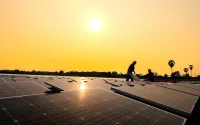29 September 2005Sify.comOdile Meuvret
The world may not end with a bang or even a whimper -- just a burp!
This is the worrying scenario sketched by a French expert, who has discovered that the world's cattle are huge contributors to global warming because of the methane emitted by their belches.
The bovine role in TEOTWAWKI (The End of the World As We Know It) scenarios has so far remained remote. Until now, the spotlight has been on cars, trucks, power stations and factories that burn fossil fuels and spew out gigatonnes of carbon dioxide (CO2), the principal greenhouse gas.
But, according to a researcher at the Climate Mission at the Caisse des Depots, a French state-owned bank, farm animals must also shoulder some of the blame.
France's 20 million cows account for an astonishing 6.5 per cent of national greenhouse-gas emissions, according to his estimates. Each year, their belches send 26 million tonnes of these gases into the atmosphere.
Their faeces -- "dejection bovine," to use the poetic-sounding French phrase -- account for another 12 million tonnes. Compare that with the 12 million tonnes of gas emitted by French oil refineries, demonised by greenies as climate-killers.
Nor is bovine gas just any old gas. It comprises methane and nitrous oxide, which volume-for-volume are 21 and 310 times more effective at trapping solar heat respectively than boring CO2.
By itself, methane is to blame for a fifth of the man-made greenhouse effect of the past 200 years. The good news is that, when it comes to cow farting, we can all breathe a little easier.
"Bovine flatulence plays a negligible role in global warming," is the prim assessment of researcher Benoit Leguet. His work seems offbeat, but its purpose is serious to pinpoint major sources of greenhouse gas that have escaped notice simply because climatology is such a young science.
Agriculture and forestry have long been identified as major factors in the greenhouse debate, both as contributors to and mitigators of the problem. But accurate data is sparse, and this has made political decisions extraordinarily difficult.
For instance, negotiations on land use tied up conclusion of the UN's Kyoto Protocol for years as countries squabbled over concessions that would cut the cost of reducing pollution by road traffic or industry.
Yet scientists warned the politicos that the assumption that forests are "carbon sinks" that safely soak up CO2 was uncertain and possibly dangerous.
France's cow population, according to the new study, accounts for 80 per cent of emissions from farm animals, with the rest generated by sheep, goats, pigs and fowl.






